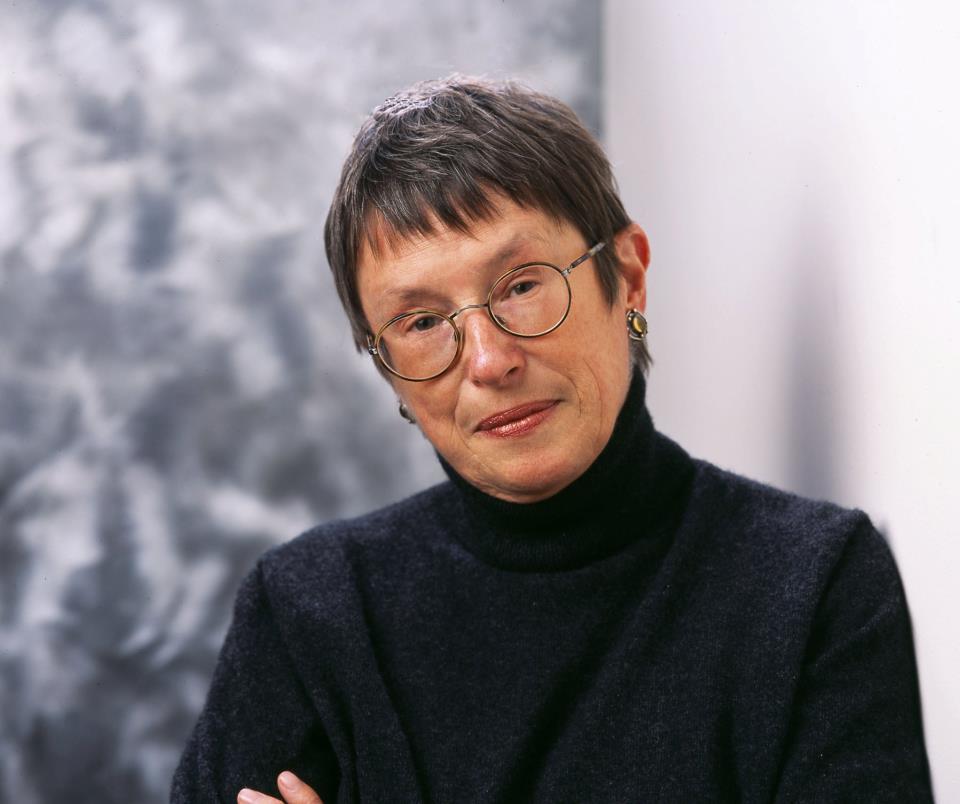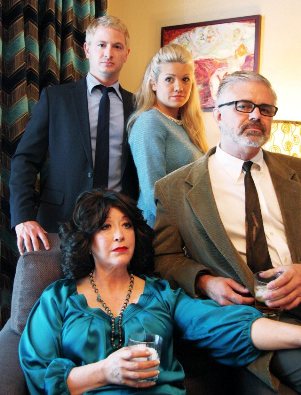Shattered survivors struggle over scraps of nourishment in a barren, apocalyptic wasteland in Workshop Theatre's new production of Edward Albee's classic play, Who's Afraid of Virginia Woolf? At least, it seems that way, as we spend a few desperate hours in the alcohol-fueled, vitriol-filled lives of a seriously disturbed, and disturbing, married couple, George and Martha. Audiences eager to experience Albee's dark fable with no holds barred will undoubtedly get their money's worth and then some, thanks to brilliant characterizations by a committed cast. Metaphors notwithstanding, the set-up for Who's Afraid is deceptively simple: two academic couples drink, carouse, and argue into the wee hours of the morning. Martha drunkenly and shrewishly criticizes George's shortcomings as a husband, a professor, and a man; he returns fire with wry, catty observations on said drunken shrewishness. Like rival boxers engaged in a harmless exhibition bout, often one or the other can't resist sneaking in a sucker punch or two. Neither really knows where to draw the line, but a bizarre game/deception has enabled the marital battle to rage on for 23 years. Like many, I read this play many years ago, and saw the Burton-Taylor film version, but I had forgotten how devastatingly witty the dialogue is. Elena Martinez-Vidal portrays Martha as an aging Snookie, the once-scandalous college president's daughter, now using booze and random affairs to carry her through a seemingly unhappy marriage. For Martha, it's far easier to get laughs from a clever play on the author Woolf's name and the nursery rhyme, than to actually discuss (or understand) Woolf's work. Stann Gwynn as George wears a natty, professorial blazer, but sinks his hands deep into its pockets as if it were an old sweater, indicating general despair. Oddly, however, he is verbally clever and quick, nimbly playing with words, images and ideas; if this brilliant man's career has stalled, one wonders how responsible his drunken wife may have been in the squashing his ambitions. Both leads are at the top of their acting game, utterly believable as these amusing yet unlikeable characters.
 Lee Williams and Giulia Marie Dalbec play a younger couple, labeled Nick and Honey in the program, although Nick is never referred to by name, and only he ever calls to his wife, as "honey." Dalbec is either offstage or passed out (or both) for almost half of the play, but does a great job in a radically different role for her, playing mousy rather than the usual vivacious. During long stretches while others are speaking, she is always completely in character, busy with countless, unobtrusive little bits of business that make perfect sense. It would be very easy to say that Williams seems awkward and self-conscious... except that Nick the character is supposed to be seen that way. One could add that he is at times overwhelmed by the forceful personalities of the two leads...yet again, the character is written that way. Albee never gives Nick the lines to establish him as a scholar or scientist; in fact, in many ways he seems to be a younger, blander, incomplete version of George himself, with modest career goals, a wife who can't hold her liquor, a wealthy and larger-than-life father-in-law, and unspoken issues in his past. (The Trekkie in me wants Nick and Honey to be George and Martha from some alternate universe, visiting via a temporal flux, but no such luck.) Overall, Williams does his best with a difficult role.
Lee Williams and Giulia Marie Dalbec play a younger couple, labeled Nick and Honey in the program, although Nick is never referred to by name, and only he ever calls to his wife, as "honey." Dalbec is either offstage or passed out (or both) for almost half of the play, but does a great job in a radically different role for her, playing mousy rather than the usual vivacious. During long stretches while others are speaking, she is always completely in character, busy with countless, unobtrusive little bits of business that make perfect sense. It would be very easy to say that Williams seems awkward and self-conscious... except that Nick the character is supposed to be seen that way. One could add that he is at times overwhelmed by the forceful personalities of the two leads...yet again, the character is written that way. Albee never gives Nick the lines to establish him as a scholar or scientist; in fact, in many ways he seems to be a younger, blander, incomplete version of George himself, with modest career goals, a wife who can't hold her liquor, a wealthy and larger-than-life father-in-law, and unspoken issues in his past. (The Trekkie in me wants Nick and Honey to be George and Martha from some alternate universe, visiting via a temporal flux, but no such luck.) Overall, Williams does his best with a difficult role.
I might have wanted to see a deeper debate on science vs. history or philosophy, but Albee  is working in a different direction entirely, as the couples spend a solid two and a half hours (plus intermissions) seemingly fighting over nothing. There's a central (and famous) plot twist that I won't reveal here, but in retrospect, it seems telegraphed from early in the first act, but I'm uncertain how newcomers to the show will perceive it. Martha tells George that he doesn't know the difference between truth and illusion, to which he replies "No, but we must carry on as though we did." In interviews, the playwright has professed a desire to aggressively engage the audience in the business of understanding the material, and accordingly we have to fill in many of the blanks and connect the dots for George and Martha's backstory and motivations. Only at the very end do we glimpse the actual affection and co-dependency shared by the couple, which then explains much of the dysfunctional fiction they have created, but audiences, scholars and critics have spent the last half century debating just how believable and effective that may be, from a literary standpoint. From a dramatic standpoint, it's quite moving.
is working in a different direction entirely, as the couples spend a solid two and a half hours (plus intermissions) seemingly fighting over nothing. There's a central (and famous) plot twist that I won't reveal here, but in retrospect, it seems telegraphed from early in the first act, but I'm uncertain how newcomers to the show will perceive it. Martha tells George that he doesn't know the difference between truth and illusion, to which he replies "No, but we must carry on as though we did." In interviews, the playwright has professed a desire to aggressively engage the audience in the business of understanding the material, and accordingly we have to fill in many of the blanks and connect the dots for George and Martha's backstory and motivations. Only at the very end do we glimpse the actual affection and co-dependency shared by the couple, which then explains much of the dysfunctional fiction they have created, but audiences, scholars and critics have spent the last half century debating just how believable and effective that may be, from a literary standpoint. From a dramatic standpoint, it's quite moving.
Director Cynthia Gilliam allows the fast and furious dialogue to proceed naturally, never missing any of the many laugh lines that pepper the dark material. I was surprised at how fresh and contemporary the 50-year-old script seemed, with just the tiniest hint of the Mad Men era, before certain modern expressions became common. Costumes (by Janet Kile) are authentic, and yet could be worn today; a couple of random references to the Depression and World War 2 are the only things to indicate the setting. Towards the show's conclusion, George recites part of a Latin requiem, while Martha recounts an often-told story. Gilliam cleverly takes advantage of Gwynn's rich voice and has him actually sing the words, giving the moment a haunting beauty that is not otherwise found in the original. Randy Strange's set accurately depicts an ordinary, upper-middle class living room, but I must praise whoever dressed the set (I'm guessing Meg Richards, credited for props.) Among all the customary suburban bric-a-brac are two framed photos, and sure enough, they are youthful portraits of Gwynn and Martinez-Vidal.
The ultimate question becomes: did I enjoy the play? My answer is that I thoroughly enjoyed and admired the performances by the cast, and the new insights gained into the material via the director's vision. I’d really question someone who actually enjoys Albee, much as one might admire the first ten minutes of Saving Pvt. Ryan, but not technically enjoy them. Albee is one of the giants of contemporary theatre, and undeniably a genius, although possibly a mad genius. Joe Six-Pack who might otherwise be watching WWE Raw will likely not appreciate this work (although it features similar smackdowns and trash-talking!) Any literate adults with backgrounds or interests in literature, sociology or psychology, and who want to see challenging themes acted out live by gifted performers, need to see this production. With only seven performances left in a 199-seat theatre, there's no excuse for there not to be standing room only. The show runs through Sat. Nov. 24th, i.e. the Saturday after Thanksgiving, contact the Workshop Box Office at 803-799-6551, or visit http://www.workshoptheatre.com for ticket information.
~ August Krickel




